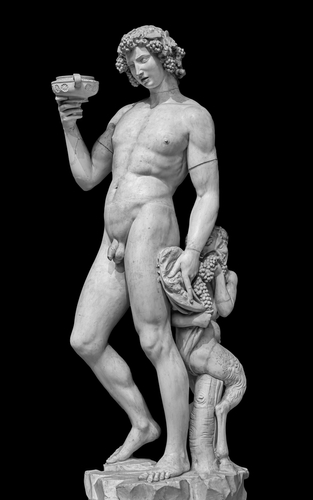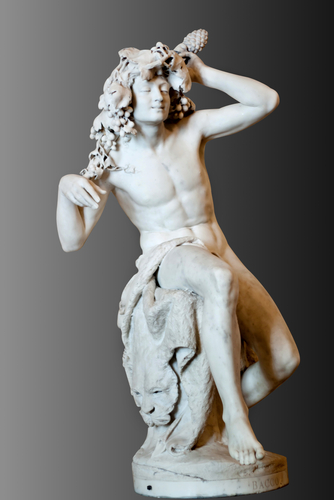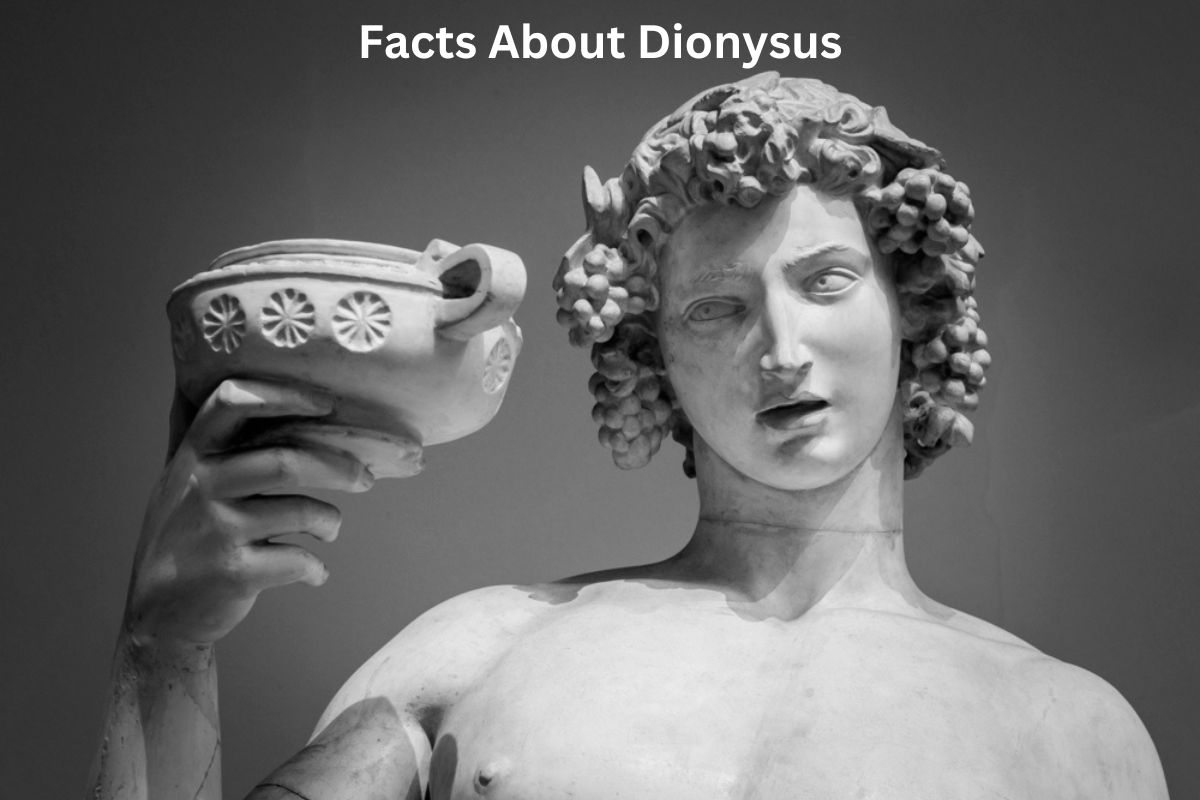Dionysus, the ancient Greek god associated with wine, celebrations, and ecstasy, is a fascinating figure in mythology. He was the son of Zeus and the mortal woman Semele, and in Roman mythology, he is known as Bacchus.
Often depicted as a young man crowned with grapevines or ivy leaves, Dionysus represents the joyous and liberating aspects of life. As the god of wine, fertility, and the theater, he played a central role in ancient Greek festivities and theatrical performances.
With his retinue of Maenads, he inspired ecstatic frenzy and wild rituals. Dionysus symbolizes the dual nature of alcohol, embodying both its positive effects of celebration and social bonding, as well as its negative consequences of excess and loss of control.
Through his travels, he spread the knowledge of wine-making and grapevine cultivation to different lands. Dionysus is a complex deity, embodying both hedonistic and protective aspects, reminding us of the interconnectedness of pleasure, nature, and the cycles of life.
Dionysus Facts
1. Dionysus is an ancient Greek god associated with wine, celebrations, and ecstasy
Dionysus was one of the major gods in ancient Greek mythology, known for his connection to wine, revelry, and the enjoyment of life.
He symbolized the uninhibited and ecstatic aspects of human existence, representing the pursuit of pleasure, liberation, and the release from societal norms.
Also Read: Hephaestus Facts
He was often invoked during festivities and celebrations, where his presence was believed to bring joy and merriment.

2. He is the son of Zeus and the mortal woman Semele
According to Greek mythology, Dionysus was the son of Zeus, the king of the gods, and Semele, a mortal princess. Zeus’s love for Semele sparked the jealousy of Zeus’s wife, Hera, who tricked Semele into asking Zeus to reveal his true form.
As Zeus’s divine form was too overwhelming for a mortal to behold, Semele was consumed by fire. However, Zeus rescued their unborn child and stitched him into his own thigh until Dionysus was ready to be born.
3. Dionysus is also known as Bacchus in Roman mythology
In Roman mythology, Dionysus was identified with Bacchus, the god of wine and revelry. The Romans adopted many aspects of Greek mythology and incorporated them into their own pantheon, often giving the Greek gods Roman names.
Thus, Dionysus became known as Bacchus in Roman culture, while maintaining many of his attributes and associations with wine, festivity, and ecstasy. The worship of Bacchus became popular in ancient Rome, with elaborate Bacchanalian festivals held in his honor.
4. He is often depicted as a young man crowned with grapevines or ivy leaves
Dionysus is commonly portrayed in ancient Greek and Roman art as a youthful and handsome figure. He is often depicted wearing a crown made of grapevines or ivy leaves, symbolizing his association with wine and the cultivation of grapevines.
These symbols highlight his role as the god of wine and fertility, as well as his connection to nature and the earth.

5. Dionysus is the god of wine, fertility, and the theater
Dionysus held multiple domains in Greek mythology. As the god of wine, he was believed to have taught humanity the art of winemaking and the cultivation of grapevines.
He was also associated with fertility, as wine was seen as a symbol of abundance and the vital force of life. Furthermore, Dionysus was linked to the theater, particularly in ancient Greece.
The Dionysia festivals, held in his honor, included dramatic performances, where plays were presented as offerings to him. Thus, he became associated with both the transformative power of theater and the revelry associated with its performances.
6. Festivals known as Dionysia were held in his honor, featuring theatrical performances and wine-drinking competitions
The Dionysia festivals were celebrated in ancient Greece as a tribute to Dionysus. These festivals included dramatic performances, particularly tragedies and comedies, which were performed in open-air theaters.
The performances were an integral part of the festival, and they explored various themes related to Dionysus, such as the nature of ecstasy, the blurring of boundaries between humans and gods, and the conflicts between civilization and the wild.
Wine-drinking competitions and revelry were also common during the Dionysia, allowing participants to indulge in Dionysian festivities and celebrate the god’s association with wine and pleasure.
7. Dionysus had a retinue of followers called the Maenads, who were women driven into ecstatic frenzy
The Maenads, also known as Bacchae or Bacchantes, were female devotees of Dionysus. They played a significant role in Dionysian rituals and festivities. These women, under the influence of Dionysus, would enter a state of ecstatic frenzy characterized by wild dances, intoxication, and ecstatic rituals.
The Maenads were often portrayed as untamed and primal, engaging in frenzied behavior such as tearing animals apart with their bare hands. Their frenzied state represented a release from societal constraints and a connection with the wild, untamed aspects of nature associated with Dionysus.
8. He is associated with both the positive and negative effects of alcohol
Dionysus symbolizes the dual nature of alcohol. On one hand, he represents the positive aspects of wine, such as its ability to bring joy, celebration, and social bonding.
Wine was seen as a gift from Dionysus that could inspire creativity, liberation, and the breaking of social barriers. On the other hand, Dionysus also embodies the negative consequences of excessive indulgence and intoxication.
The intoxicating effects of alcohol could lead to loss of control, madness, and destructive behavior. Dionysus thus embodies the paradoxical nature of alcohol, with its potential for both positive and negative outcomes.
9. Dionysus traveled extensively, spreading knowledge of wine-making and grapevine cultivation
According to Greek mythology, Dionysus embarked on various journeys and expeditions, spreading the cultivation of grapevines and the art of winemaking to different regions.
He was believed to have traveled to various lands, including Asia and Egypt, where he shared his knowledge and taught people how to cultivate grapes and produce wine.
As a result, Dionysus was revered as a divine benefactor who brought the gift of wine and its associated cultural practices to humanity.
10. He was a complex deity, embodying both hedonistic and protective aspects
Dionysus encompassed a range of characteristics and qualities. On one hand, he represented hedonism, pleasure, and the pursuit of ecstatic experiences.
He encouraged individuals to let go of societal constraints, tap into their inner desires, and embrace the wild and untamed aspects of existence.
On the other hand, Dionysus also had a protective and nurturing side. He was associated with the growth of crops, particularly grapevines, and was considered a patron deity of agriculture.
He symbolized the cycle of life, death, and rebirth, as represented by the growth and harvest of crops. Thus, Dionysus embodied the juxtaposition of wild abandon and fertility, reminding humans of the interconnectedness of pleasure, nature, and the cycles of life.
